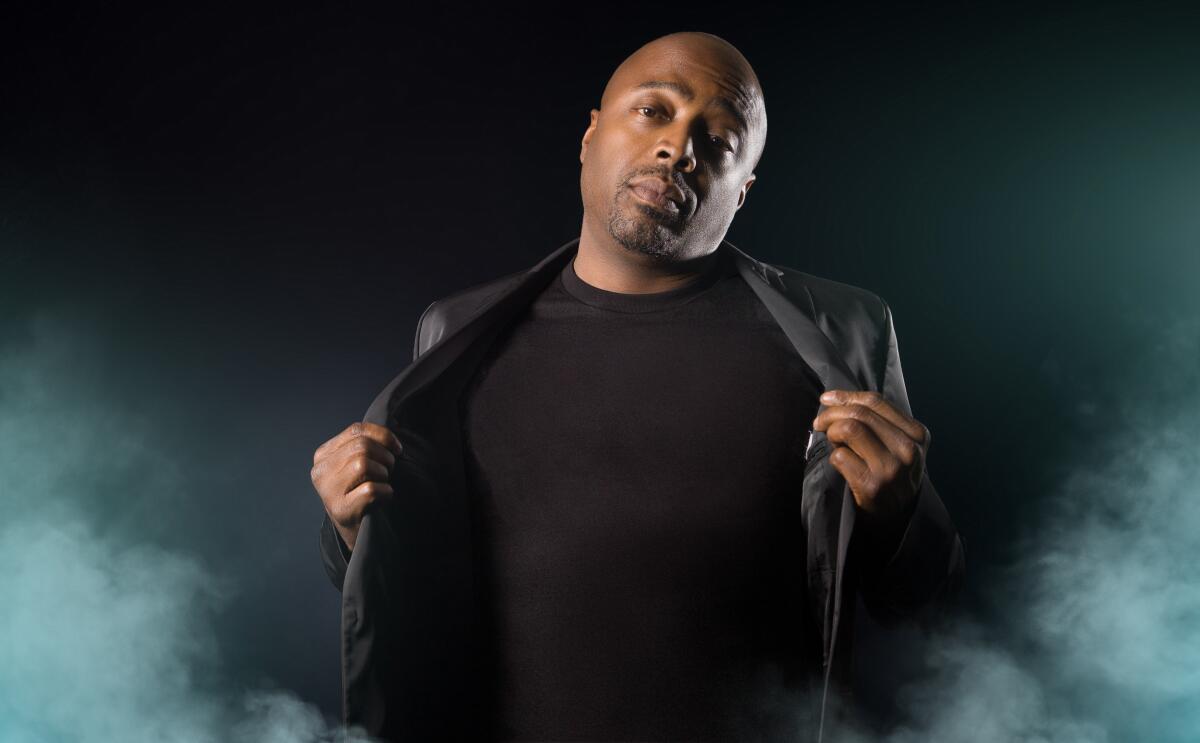The rise and fall of cancel culture in comedy
Ross May / Los Angeles Times; Getty Images
- Share via
For as long as people have been able to publicly voice their dissent, some version of cancel culture has existed.
It used to be that letters to the editor and the watercooler were the only places to share our opinions. But today, in our chronically online era, social media’s influence has allowed the voices of the dissenters to be incessant, accessible and amplified.
“Social media creates the illusion that hostility is greater because you’re scrolling all day,” said former stand-up comic and comedy historian Kliph Nesteroff. “Whereas in the old days, we would read the newspaper once a day and then throw [it] out. Today [with] the social media equivalent, we’re never throwing out the newspaper.”
Back in the analog days, “If 100 people wrote to complain, [publications] would just publish one letter,” said Nesteroff. “Today, because there’s no editor, you’ll see all 100 of those letters in the form of a tweet. Where there used to be a filter, now all 100 complaints reach your eyeballs. The effect is this illusion that there’s way more irrational, angry people than previous generations. It’s not true, they were always there.”
Performers today have more freedom of speech than before, not less.
In stand-up comedy, where immediate public feedback is delivered in the form of applause or heckling, the stakes have always been particularly high.
As a stand-up comic in the ’90s before the advent of podcasts and social media, Nesteroff remembers being punched by audience members and having beer thrown at his head were standard heckling practices. “I had a [club owner] who hated me so much that he turned the radio on over the speakers to drown me out onstage,” he said. “Today, you’d call it cancel culture or ‘comedians under fire,’ but then it was just considered the brutal hard knocks of [show business]. You had everything going against you, but that’s how you got better.”

Nowadays, cancel or outrage culture can be a social addiction in itself. “It’s a nice way for some people to get their 15 minutes of fame,” said comic Donnell Rawlings. “With cancel culture, it’s so easy to take sound bites, little excerpts out of any comedian’s show and print two or three sentences to make them look inappropriate. But what you have to respect is the craft and the art. There’s a lot of things that contribute to [whether or not a joke lands]: Is that comic likable? Do people want to learn something? What was the joke before that? People are so quick to find something that they’re offended about that they don’t even give it a chance.”
Suppression and censorship are essentially built into the fabric of America, Nesteroff said. “The very start of America is the suppression of Indigenous languages, ceremonies and religions and the curtailment of mobility for Native Americans,” Nesteroff said. “That’s the inception of the country as we know it. Types of suppression have always existed.”
And comedians have faced danger on the job at least since medieval times when court jesters were tasked with keeping monarchs entertained. “The court jester was supposed to tell what’s going on in the kingdom and make it funny,” said Tiffany Haddish. “If the king didn’t like what you had to say, you could be locked up or killed, [beheaded], ostracized, excommunicated. When people back in the day would get up in front of audiences, if they didn’t like what you had to say, they would throw spoiled food and rocks at you. I really believe that the comedian, over the course of history, has been the needle-mover, the one to point out the downfalls and faults in society and everybody doesn’t necessarily like that.”
Until the late 20th century, cancel culture was enforced by police who could arrest comics on obscenity charges. But, as is still the case today, implicit bias led to an arbitrary enforcement of the law, with many comedians finding themselves in the line of fire.
“In the days of vaudeville, there was a whole list of words you couldn’t say onstage,” said Nesteroff. “You certainly couldn’t swear. And if you did, you would be fired from the vaudeville circuit. Even if you had a contract, it would be negated.”
“You could go to certain states and you couldn’t say certain words, you couldn’t cuss, you couldn’t talk about sex or homosexuality,” said Haddish. “They’d call the police on you and you -[would be] arrested.”
Meanwhile, the national radio show “Amos ‘n’ Andy,” which starred two white guys speaking in a blackface dialect, managed to stay on the air despite listener protest. While there had been an unsuccessful boycott campaign to have the show taken off the air (including a petition that garnered nearly a million signatures), the controversy was largely ignored by mainstream media and only covered by the Black press.
“It was only covered in [Black papers like] the Pittsburgh Courier, the Chicago Defender, New York Amsterdam News, the New York Age and other major Black papers,” said Nesteroff. “The white papers barely covered the controversy so this Black protest movement was easily ignored.”
The show continued to air from 1928 until 1960 and was even spun off into a short-lived TV series, this time starring Black actors in a majority of the roles.
A mere decade after the show went off the air, comedians like Lenny Bruce, Richard Pryor, George Carlin and Bowley and Wilson were arrested for material they performed onstage on charges of obscenity. “The police were trying to hold onto laws that the courts had already deemed unconstitutional,” said Nesteroff. “So they were they were performing for the sake of harassment, really, and grasping at straws that were no longer there. Had those busts happened 20 years before that, then they would have probably served three months, six months, a year in jail.”
Today, obscenity laws are virtually extinct. Which is not to say that censorship no longer happens. “If it is illegal to say something, that is censorship,” said Nesteroff. “If somebody protests what you say, that is not censorship. A lot of the time the political players that try and exploit controversy will make that misattribution. But without the power of the law behind you, you can’t really censor as an individual, you can [only] protest.”

Cancel culture is starting to lose some of its bite, Rawlings said. “At a point in time, a lot of people in comedy were super nervous. Didn’t know what to do, were trying to protect money that they hadn’t even made yet.”
But now, “people are fed up with [cancel culture],” he said. “They’re getting abusive with the power that they think they have. People are going to start canceling cancel culture by going to the shows — all cancel culture wants to do is stop your money. [Major corporations may drop you, but] if the fans don’t drop you, cancel culture is nonexistent.”
“I really think people are overly critical of stand-up comics,” he added. “It is so easy to research the person beforehand to know what their background and style is. If there is a particular comic that you don’t like, you can choose to support it or not.”
The constant amplification of controversy is the work of think tanks that stoke division for political gain, Nesteroff said. “There’s a lot of shady players out there that push propaganda, that exploit people for their own gain, that like to divide and conquer. And a lot of people cannot see through that veil because it’s intentionally obscured.” But the majority of the controversies and the hostility is essentially fabricated in a laboratory by think tanks that are funded by reactionary political movements that provide talking points behind the scenes to demonize opponents, Nesteroff said.
With constant scrolling of social media, “you see variations of the same headline over and over all day,” said Nesteroff. “It reinforces a hysterical feeling in us when previously, if we even read the paper at all, we would just read it once. Today those complaints are taken so seriously, but there’s a good chance that 50 years hence they will seem comical, like these people actually thought the sky was falling when it wasn’t. Or the opposite: Maybe they were very legitimate concerns that were being discredited.”
More to Read
The biggest entertainment stories
Get our big stories about Hollywood, film, television, music, arts, culture and more right in your inbox as soon as they publish.
You may occasionally receive promotional content from the Los Angeles Times.











